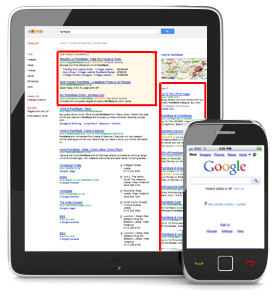Following on from Ian’s latest offering on the Yorkshire Times website, which outlined his top 10 tips for a successful paid search campaign on Google, here we go into slightly more advanced tips for those who have already dabbled in running PPC campaigns on Google AdWords. There is always room for improvement!
These tips might help trouble shoot some common questions and/or help you make your budget work harder for you:

Ads not showing after a new campaign goes live
When your campaigns are first set live, it is normal to not see your ads consistently on Google, as they can be shown erratically for the first few days while AdWords works out quality scores for your keywords. Even after that the results in your own browser may be affected by your personal search history. Use Googles ad preview tool to see the results as others see them; this is also useful for viewing the results as they would be seen in different regions around the country (or world).
Be sure to link your AdWords and analytics accounts for best results – especially for ecommerce businesses
Setting up your Google Analytics and AdWords accounts should not be done hastily. Take your time and make sure your AdWords link correctly to your Analytics, which will allow you to accurately check the success of your new campaign. You need to have complete visibility over how your PPC budget it is being spent so you can decide if the campaigns are a good investment / working at their optimum level.
Following on from this ensure that AdWords conversion tracking code has been implemented correctly (or alternatively set up goals through Google Analytics and import them into AdWords). In the case of ecommerce sites, this must include value tracking as well. Without this it will be difficult to track campaign performance and work out whether your campaign is a success or not.
Good PPC management requires an investment of time
When the campaign is live, it cannot just be left to run by itself, PPC requires ongoing optimisation, such as altering and updating ad text and continually adjusting your maximum bid price. The campaign will require time invested in it every month. You should be reviewing the performance and making tweaks to it on an ongoing basis. Seasonal fluctuations can also impact on your success so be sure to plan in advance for your peak times and ensure your PPC campaigns are set to maximise opportunities in these periods.
If you can’t invest the time, or feel that your knowledge of PPC and the maths involved is not at the appropriate level to get the best results from it; consider asking a specialist agency to help you.
Check your budgets regularly
It is important to make sure your daily budgets are set appropriately and are sufficient enough to last the whole day. If you are running out of budget before the end of the day, you may not need to up the budget but just focus on your most profitable campaigns and turn those off that are not delivering a good ROI.
Optimise, test and tweak ad text for best results
One of the most critical factors of creating a successful PPC campaign is to ensure that your ad text is informative, engaging and is without spelling or grammatical errors. Mistakes such as this could negatively affect your brand image and click-through rate. Each ad needs to also target the correct demographic as some forms of messaging will be more effective than others with certain groups.
You should split test ad texts and different calls to action to see which are most effective. Adverts with improved CTR’s will help boost your Quality Score also. Have a read of this informative post from Google about what Quality Score is and how it affects your campaigns if you are unsure.
Don’t neglect your landing pages
For a PPC campaign to be truly successful the landing page of the ads needs to be suitably conversion-orientated. Bringing traffic to the site from your adverts is all well and good, but if once on the site they swiftly leave due to poor navigation and no clear calls to action presented on the page, landing page testing should be implemented to establish what would be the best way to drive conversions.
Use AdWords editor to make bulk changes if you need to
Depending on the size of your campaigns making changes can be tricky. By downloading the AdWords Editor you will be able to make bulk changes to campaigns in a much simpler manner and set up even the most granular of campaigns with ease.
Gain more insight and dabble in attribution modelling
Use Google Analytics multi-channel funnels or AdWords search funnels to gain a fuller insight into your campaigns sales contribution. For example, if you’re getting a large volume of conversions through your own brand terms, it may be that your generic terms do play a key role, however if they are not the final touch-point before the sale is made, they will not be getting the attribution. It is important to assign credit where its due if bids are to be appropriately set.
Summary
To ensure that you remain up to date with PPC industry updates the official AdWords blog (https://blog.google/products/ads-commerce/) is a great source of information and an excellent way of staying ahead of your competition. We also regularly post informative blogs about PPC best practice so keep abreast of the latest news by signing up to our newsletter – The KeyWord.
By following these tips you should be able to greatly improve your PPC campaigns and increase your ROI. An effective paid search campaign will not only provide you with increased sales and leads but ultimately grow your profits too!


